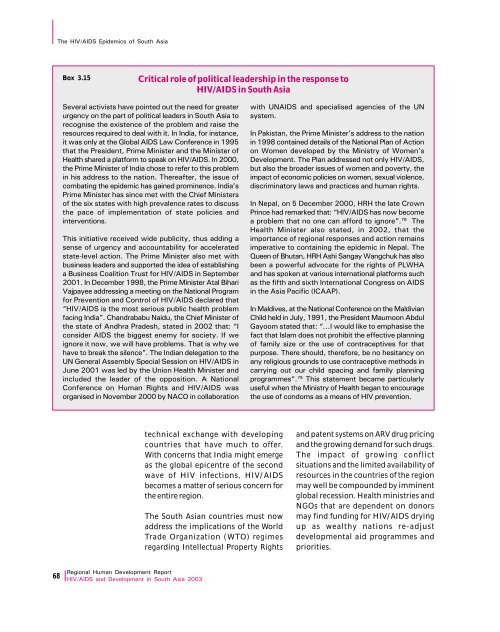Download Report - UNDP Asia-Pacific Regional Centre - United ...
Download Report - UNDP Asia-Pacific Regional Centre - United ...
Download Report - UNDP Asia-Pacific Regional Centre - United ...
You also want an ePaper? Increase the reach of your titles
YUMPU automatically turns print PDFs into web optimized ePapers that Google loves.
The HIV/AIDS Epidemics of South <strong>Asia</strong>Box 3.15Critical role of political leadership in the response toHIV/AIDS in South <strong>Asia</strong>Several activists have pointed out the need for greaterurgency on the part of political leaders in South <strong>Asia</strong> torecognise the existence of the problem and raise theresources required to deal with it. In India, for instance,it was only at the Global AIDS Law Conference in 1995that the President, Prime Minister and the Minister ofHealth shared a platform to speak on HIV/AIDS. In 2000,the Prime Minister of India chose to refer to this problemin his address to the nation. Thereafter, the issue ofcombating the epidemic has gained prominence. India’sPrime Minister has since met with the Chief Ministersof the six states with high prevalence rates to discussthe pace of implementation of state policies andinterventions.This initiative received wide publicity, thus adding asense of urgency and accountability for acceleratedstate-level action. The Prime Minister also met withbusiness leaders and supported the idea of establishinga Business Coalition Trust for HIV/AIDS in September2001. In December 1998, the Prime Minister Atal BihariVajpayee addressing a meeting on the National Programfor Prevention and Control of HIV/AIDS declared that“HIV/AIDS is the most serious public health problemfacing India”. Chandrababu Naidu, the Chief Minister ofthe state of Andhra Pradesh, stated in 2002 that: “Iconsider AIDS the biggest enemy for society. If weignore it now, we will have problems. That is why wehave to break the silence”. The Indian delegation to theUN General Assembly Special Session on HIV/AIDS inJune 2001 was led by the Union Health Minister andincluded the leader of the opposition. A NationalConference on Human Rights and HIV/AIDS wasorganised in November 2000 by NACO in collaborationwith UNAIDS and specialised agencies of the UNsystem.In Pakistan, the Prime Minister’s address to the nationin 1998 contained details of the National Plan of Actionon Women developed by the Ministry of Women’sDevelopment. The Plan addressed not only HIV/AIDS,but also the broader issues of women and poverty, theimpact of economic policies on women, sexual violence,discriminatory laws and practices and human rights.In Nepal, on 5 December 2000, HRH the late CrownPrince had remarked that: “HIV/AIDS has now becomea problem that no one can afford to ignore”. 78 TheHealth Minister also stated, in 2002, that theimportance of regional responses and action remainsimperative to containing the epidemic in Nepal. TheQueen of Bhutan, HRH Ashi Sangay Wangchuk has alsobeen a powerful advocate for the rights of PLWHAand has spoken at various international platforms suchas the fifth and sixth International Congress on AIDSin the <strong>Asia</strong> <strong>Pacific</strong> (ICAAP).In Maldives, at the National Conference on the MaldivianChild held in July, 1991, the President Maumoon AbdulGayoom stated that: “…I would like to emphasise thefact that Islam does not prohibit the effective planningof family size or the use of contraceptives for thatpurpose. There should, therefore, be no hesitancy onany religious grounds to use contraceptive methods incarrying out our child spacing and family planningprogrammes”. 79 This statement became particularlyuseful when the Ministry of Health began to encouragethe use of condoms as a means of HIV prevention.technical exchange with developingcountries that have much to offer.With concerns that India might emergeas the global epicentre of the secondwave of HIV infections, HIV/AIDSbecomes a matter of serious concern forthe entire region.The South <strong>Asia</strong>n countries must nowaddress the implications of the WorldTrade Organization (WTO) regimesregarding Intellectual Property Rightsand patent systems on ARV drug pricingand the growing demand for such drugs.The impact of growing conflictsituations and the limited availability ofresources in the countries of the regionmay well be compounded by imminentglobal recession. Health ministries andNGOs that are dependent on donorsmay find funding for HIV/AIDS dryingup as wealthy nations re-adjustdevelopmental aid programmes andpriorities.68<strong>Regional</strong> Human Development <strong>Report</strong>HIV/AIDS and Development in South <strong>Asia</strong> 2003
















